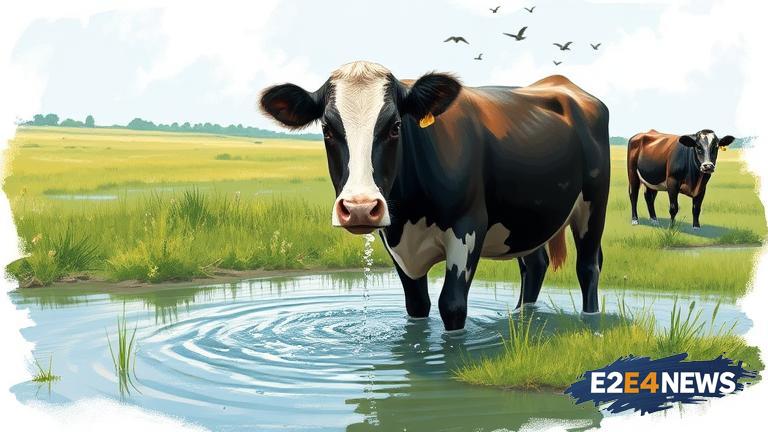Clean water is a crucial component in cattle production, playing a significant role in maintaining animal health, productivity, and overall environmental sustainability. The importance of clean water cannot be overstated, as it directly affects the well-being and performance of cattle. Access to clean water is essential for cattle to stay hydrated, regulate their body temperature, and maintain proper digestion. Moreover, clean water helps to prevent the spread of diseases, reducing the need for antibiotics and other medications. In addition, clean water is vital for the production of high-quality milk and meat, as it directly impacts the nutritional content and safety of these products. Cattle producers must ensure that their water sources are free from contamination, such as bacteria, viruses, and parasites, which can have devastating effects on animal health. Regular testing and monitoring of water quality are essential to identify potential issues and take corrective action. Furthermore, cattle producers must also consider the impact of water quality on the environment, as contaminated water can pollute soil, air, and groundwater. Best practices for maintaining clean water in cattle production include implementing proper waste management systems, using water treatment technologies, and promoting conservation practices. It is also essential to provide cattle with access to clean water at all times, using techniques such as rotational grazing and water distribution systems. Moreover, cattle producers must stay up-to-date with the latest research and technologies to ensure that their water management practices are effective and sustainable. The economic benefits of clean water in cattle production are also significant, as it can lead to increased productivity, reduced veterinary costs, and improved product quality. In contrast, the costs of poor water quality can be substantial, including reduced animal performance, increased mortality rates, and environmental degradation. To address these challenges, governments, industry organizations, and cattle producers must work together to promote clean water practices and provide education and training on water management. Additionally, research institutions and universities must continue to study the importance of clean water in cattle production, developing new technologies and strategies to improve water quality and availability. The use of clean water in cattle production is not only a moral imperative but also an economic and environmental necessity. As the global demand for animal products continues to grow, the importance of clean water in cattle production will only continue to increase. In conclusion, clean water is a vital component of cattle production, and its importance cannot be overstated. By prioritizing clean water, cattle producers can improve animal health, productivity, and environmental sustainability, while also promoting economic viability and social responsibility. The future of cattle production depends on the ability to provide clean water, and it is essential that all stakeholders work together to address this critical issue. The impact of clean water on cattle production is multifaceted, affecting not only animal health but also the environment, economy, and society as a whole. As such, it is essential to adopt a holistic approach to water management, considering the complex relationships between water, animals, and the environment. By doing so, cattle producers can ensure that their operations are sustainable, responsible, and environmentally friendly, while also promoting animal welfare and product quality.
